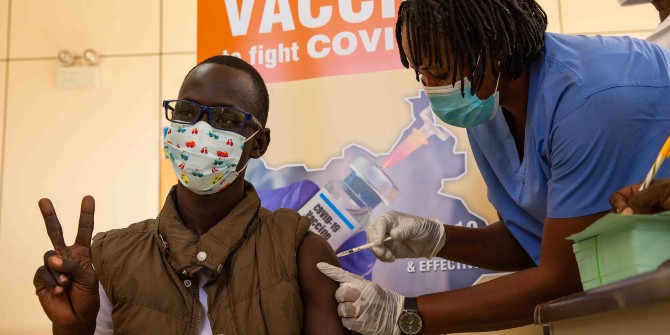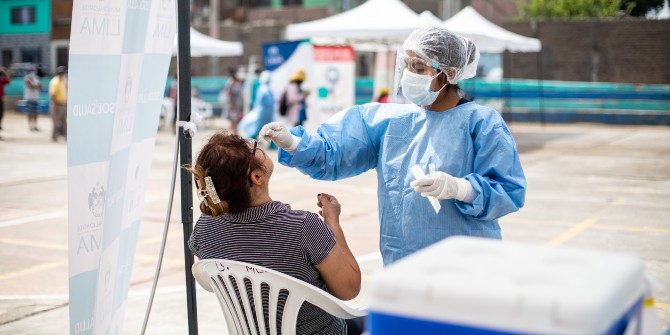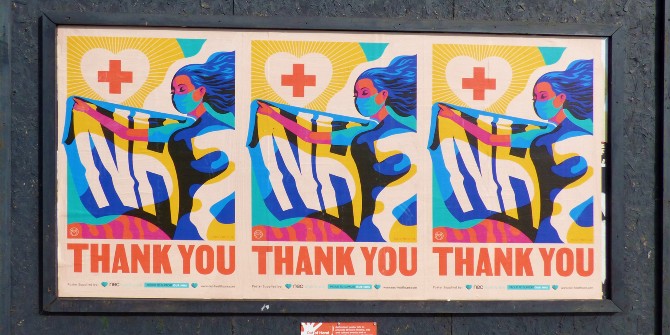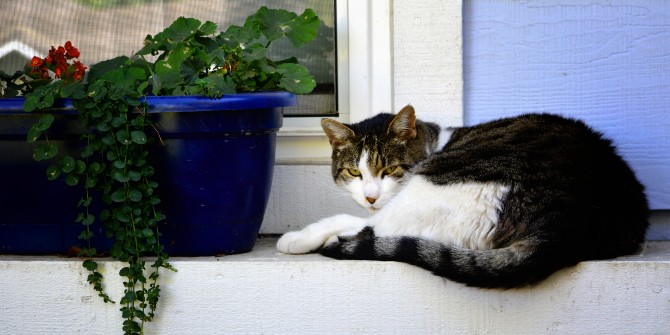For many people in rural South Sudan, the health impacts of COVID have been invisible, in contrast to more apparent dangers. Pandemic responses and news internationally have also fuelled suspicion towards COVID vaccines. If vaccine uptake on a global scale is needed to live with the virus, understanding these attitudes is vital for building trust towards global health interventions, says Naomi Pendle (LSE).
It was hot, so we sat under the shade of a market stall and drank tea. It was early 2022, and I was visiting a small market village in northern South Sudan. An old friend lived in the village, who I saw to catch up about our lives and the news; I had not seen him for many years. We talked about family, friends and various research projects. Then I thought I would add a question about COVID-19 vaccinations.
He looked at me dismissively. “No-one here has been vaccinated.” His tone suggested that the question was irrelevant. It was the only moment our conversation felt distant.
COVID vaccinations were unavailable in the village, but they were available in the nearest city of Wau. Getting to the city involved a couple of hours journeying in a car which, for most, would have been in a commercial vehicle (run like a private bus service) with a fee paid. In the nearest town, vaccines were easily and freely available in one of the better health facilities. When I visited one evening, there was no wait and a nurse was ready to jab me instantly.
People in the market village and surrounding rural areas often travelled to Wau to seek medical treatment and advice. Some people had even bought land in the city so that they could build a home to help send their children to school, or in case their aging parents needed to spend time in the city for medical support. Wau was woven into the everyday navigations of health for those in this village. However, people were not rushing to the city for the COVID-19 vaccination. There was no appetite to be vaccinated.
For South Sudanese in South Sudan, why then is COVID-19 seen as irrelevant and the vaccine untrustworthy? The answer highlights how vaccine hesitancy is influencing trust around the globe.
COVID-19 as irrelevant and invisible
Vaccine hesitancy is partly driven by a disbelief in and the irrelevance of the COVID virus. For many in rural South Sudan, the consequences of the disease have been invisible and other things considered more dangerous. Over the last two-years in rural areas, since the pandemic started, many older people have died. Yet, no-one is clear that these patterns of mortality were abnormal; no-one counted the dead before or after the pandemic started. Plus, people described how it was ambiguous whether their symptoms were from COVID-19. With no testing to confirm either way, deaths were assumed to have another cause. After all, death from COVID could bring stigma and interrupt burial rites. People mentioned their fear in labelling someone’s death as being from COVID in case it prevented a dignified burial.
The perception of the disease’s irrelevance is not due to people being ill-informed about COVID. Decades of wars in the 1980s, 1990s and 2000s had delayed the development of infrastructure and communications in rural areas, but in the village where I sat, the phone network had reached these rural areas in 2013. Internet was strong, Googling common and educated people had regular access to global news sources. In the first months of 2020, before the pandemic was declared, people in the village where I sat were already discussing COVID and knew about it from the outset. At this stage there was fears. Yet these fears went unrealised.
While COVID was invisible, people confronted many other potentially fatal dangers whose consequences were incredibly visible. Near this small market, there was a raging Tuberculosis outbreak that was impacting one clan in particular. There had also been a measles outbreak in recent years that had killed children. These infectious diseases had immediate consequences and prompted patterns of mortality that caused fear and prompted action. There were also the dangers of armed conflict. In the neighbouring county, as well as destroying property and crops, conflict had killed hundreds in the last year – a visible, certain killer.
In previous research that we conducted in South Sudan in 2021, South Sudanese spoke of COVID as “your disease” – i.e. the disease of foreigners. It was not just that wealthy foreigners appeared to get COVID more, but that people in South Sudan perceived that it mattered to wealthy foreigners more as, generally, these foreigners’ lives were safer, healthier, insured and more secure. COVID-19 was frightening to wealthy foreigners as it was uncertain and, initially, inescapable through wealth. South Sudanese, alternatively, had other things to worry about.
COVID-19 vaccines are untrusted
As well as COVID seeming irrelevant, people were also weary of the vaccine.
Imported vaccines and medication are common in South Sudan. Pharmaceuticals flow into cities and rural markets across the country via trade routes through both Juba (South Sudan’s capital) and Khartoum (Sudan’s capital). They reach rural markets through various routes, many of which are unregulated in practice. Therefore, with a plurality of medicines and pharmaceuticals available, South Sudanese have long had to develop strategies to decide which medication to trust.
In research we conducted in 2020 and 2021, South Sudanese highlighted the various strategies they used to make judgements about medicines. Experience and trusted friends’ experiences were a crucial part of judging which providers were legitimate. This research also highlighted how the global response to COVID-19, including lockdowns and trade barriers, undermined South Sudanese trust in global health advice. With people increasingly distrusting of global health advice, actors like the World Health Organization lacked authority to push for vaccine uptake.

As I talked with people in February 2022, vaccine nationalism was also highlighted as a factor in these calculations of trust. From the early days of the COVID-10 vaccinations, European and American politicians have been accused of playing national politics through their displays of trust in the vaccines. There were some high-profile European, political hesitations about AstraZeneca vaccines at about the same time this vaccine first arrived in South Sudan. People I spoke to in South Sudan also mentioned how the manufacturing of AstraZeneca in India made them trust it less. Nationalised assumptions and prejudices have become a way for South Sudanese to judge medical quality.
South Sudanese attitudes beyond South Sudan
As Malith Kur has highlighted, the South Sudanese diaspora remain deeply connected to communities in South Sudan and their trust and knowledge is shaped through these networks. Many South Sudanese living abroad invest time and money to remain connected to South Sudan and remain South Sudanese. Being South Sudanese for many has included this rejection of the significance of COVID. After all, to accept its relevance is to imply that other diseases and South Sudan’s wars are no longer relevant to them. This irrelevance would highlight their socio-economic distance from the land they still called “home”. For South Sudanese in the diaspora, to fear COVID-19 is to act less South Sudanese.
If the vaccine is central to the world’s ability to live with COVID, then understanding those who reject the vaccine is key. At the same time, vaccine rejection among South Sudanese embodies the rejection of global priorities that have repeatedly ignored South Sudanese concerns.
This post represents the views of the author and not those of the COVID-19 blog, nor LSE. It results from research at the Ethnographies of (Dis)engagement project at the LSE Firoz Lalji Institute for Africa and first appeared at the Africa at LSE blog.





